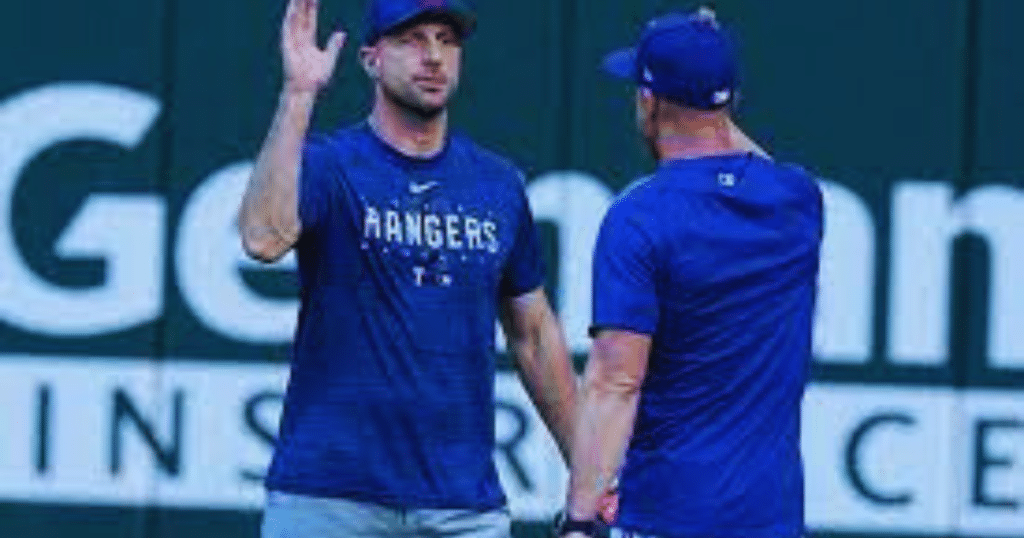
The Astros-Rangers Rivalry: A Reflection of Texas’s Essence Ryan Pressly can still recall vivid memories of being seated in the stands, watching the Texas Rangers during the 2010 ALCS. Inside the news conference room at Minute Maid Park, he sits with the bill of his Houston Astros cap casting a shadow over his eyes. Hailing from the Dallas area, Ryan was an ardent Rangers fan, with a particular fondness for Michael Young. Yet today, he’s the Astros’ relief pitcher.
“I never could have imagined winding up in this predicament,” Pressly reflects. “I am simply grateful to be here.” Despite his popularity, Ryan maintains a reticent demeanor. He eschews social media, preferring a silent dedication to his craft.
“Ryan is a private individual,” his wife, Kat Pressly, reveals. “He enjoys solitude, spending time on the ranch, embracing nature, and going hunting. He’s not fond of excessive attention or media presence.”
As Ryan concentrates on helping the Astros in the series, Kat takes charge of securing tickets for their family as the games shift to Arlington. She estimates they have acquired about 20 tickets, but the constant ringing of her phone, including calls from Ryan’s closest friends, implies that this number may increase significantly before Game 3 on Wednesday. Ryan has instructed everyone that, as they will be seated in the Astros’ family section, donning anything Rangers-related is strictly forbidden.
When asked if he’s excited to compete against his childhood team, Ryan responds, “It’s the same game, just happening to be in my hometown.” Jose Ruiz, meanwhile, kneels beside the mural along the third base line at Minute Maid Park, gazing up at it and capturing images with his smartphone. “Are you from Houston?” I inquire.
“Absolutely,” he replies, rising to his feet and smoothing his orange-hued dress shirt adorned with the Astros’ logo. It’s the lead-up to the all-Texas ALCS. “I arrived here in 1980,” shares Ruiz, originally from San Benito, a five-hour drive from Houston. “Hailing from a quaint hometown without a hint of professional sports, I figured, ‘At least I’ll finally have some teams to cheer for.'”
Back then, when he relocated to Houston, the Astros were struggling. They did manage to clinch the AL West in 1980, but they were far from perennial contenders. Ruiz and his wife paid a mere $5 to attend games at the Astrodome, selecting seats without restrictions due to the sparse attendance.
“I believed they’d struggle for the rest of my life, and I accepted it,” Ruiz reflects, understanding that such trials are an integral part of being a devoted fan. “There are certain baseball enthusiasts who unwaveringly back their teams, regardless of whether they clinch a championship.”
Ruiz witnessed decades of subpar baseball and assumed this would be his fate as well. “Then they began to make strides, and it was nothing short of exhilarating,” he reminisces. Among his friends from Dallas, he gained bragging rights. “They mockingly call me a cheater. They won’t let it go.”
“The Astros-Rangers Rivalry Unveiled”

The perception that the Astros are cheaters is widespread, extending beyond his friends. Whenever the Astros play away from home, they endure a chorus of boos. “It’s us against the world,” Ruiz declares.
Dr. Walter L. Buenger, a history professor at the University of Texas, possesses a unique perspective.
Prior to entering academia, he grew up in Fort Stockton, a town situated about 90 minutes from the nearest urban center, Odessa. His grandparents were of German descent, and his father spoke German in Texas until he commenced school.
“I have a distinct perspective compared to many Texans,” Buenger explains, his West Texas drawl evident. He heard stories from his grandparents about the mistreatment of Germans and the Ku Klux Klan’s persecution in the 1920s. He acknowledges that Texas is a complex place from both a personal and intellectual standpoint.
The rivalry between Houston and Dallas, underscored by their proximity and historic competition, captures this complexity. The competition encompassed everything from the location of the National Reserve Bank to business deals, connections, and even the right to host the Texas Centennial.

Dallas won many of these contests, including the honor of hosting the Texas Centennial. Buenger asserts that this event marked a point of identity division between the two cities. Before then, the non-Mexican regions of Texas considered themselves more southern.
With the centennial celebration came the State Fair of Texas, and with it, Big Tex, the iconic cowboy at the heart of the fair. Buenger regards Big Tex as a fitting symbol for 1930s Dallas. Although Dallas has since become more diverse, Houston has consistently featured greater demographic diversity.
Dallas embraced the cowboy as a symbol of identity, while Houston identified with the oil industry. These distinctions, coupled with their longstanding rivalry and their close proximity, fueled the enmity.
“It’s a myth,” Buenger reflects on the notion of Texas identity. These myths are malleable, erasing a fraught past. They obscure the role of cotton and slavery in shaping Houston, Dallas, and the entire state. They overlook the fact that the Rangers are named after a law enforcement agency involved in the lynching of Mexicans.
Few acknowledge that Houston was home to the first official baseball team, which played its inaugural game in April 1868 on the same San Jacinto battleground where Texas secured its independence from Mexico. That day, the Houston Stonewalls triumphed over the Galveston Robert E. Lees with a staggering score of 35-2.
“In Texas, memory often takes precedence over reality,” Buenger observes. “Memory entails both remembering certain elements and forgetting others.” Jason Flores expresses his concern about Houston pitcher Justin Verlander’s performance during the sixth inning, following Leody Taveras’ solo home run that handed the Rangers an early series advantage.
“But they’re rallying,” Joel Flores counters in support of the Astros. “They’re getting back in the game.”
Jason and Joel, twin brothers, watch the game on Joel’s mobile device near the entrance of the Magnolia Hotel, a short distance from Minute Maid Park, where they serve as valets.
On October nights when the Astros play at home, they experience a surge in activity, particularly before and after the game when fans arrive and depart. “The garage gets packed,” Jason notes. “We often have visitors who specifically choose our hotel for the game.” They stay here for a few days, for as long as the Astros are in town.”
Both Jason and Joel are lifelong Astros enthusiasts who harbor a profound affection for all things Houston and a distinct aversion to Dallas, particularly the Cowboys. For them, the Astros being jeered away from home is of no consequence. Jason explains, “I’m a Houstonian. That’s my identity, through and through, and that’s my team.”
As they stand watching a few pitches from Game 1 on Joel’s phone, I ask them to contemplate the unimaginable. “Suppose the Rangers advance to the World Series. Would you root for them because they’re a Texas team?” “Absolutely not,” Jason and Joel respond nearly in unison. “To heck with the Rangers,” Joel asserts. “If they win, I’m out. It’s time to back the Texans.”
The Astros-Rangers Rivalry: A Reflection of Texas’s Essence

When it comes to sports rivalries, few can match the intensity and passion of the Astros-Rangers rivalry in the heart of Texas. This fierce competition between the Houston Astros and the Texas Rangers goes beyond the boundaries of a baseball diamond. It’s a reflection of the Lone Star State’s essence, its history, and the pride of its people. In this long-form article, we will explore the rich tapestry of this rivalry, delving into its history, key moments, and the cultural significance it holds for Texans.
The Birth of a Rivalry
The Astros and the Rangers are two Major League Baseball (MLB) teams representing Texas, a state known for its larger-than-life everything. The Astros, originally known as the Houston Colts, were established in 1962, while the Rangers, formerly the Washington Senators, relocated to Texas in 1972. The close timing of their formation set the stage for a natural rivalry.
The Lone Star Series
One of the key elements that make this rivalry special is the annual “Lone Star Series.” This interleague series pits the Astros against the Rangers in a battle for Texan supremacy. The Lone Star Series not only ignites the passions of fans but also showcases the talents of both teams.
The Texas-Sized Showdowns
Over the years, the Astros-Rangers rivalry has witnessed epic showdowns that have etched themselves into the annals of Texan sports history. From Nolan Ryan’s fiery fastball to the Astros’ memorable playoff runs, these moments have brought the state to its feet.
The Lone Star Showdown of 2005
In 2005, the Astros and the Rangers clashed in a memorable series that Texans still talk about. The Astros’ surge to the World Series that year brought an entire state together, transcending the boundaries of the baseball diamond.
Nolan Ryan: A Texas Icon
No discussion of the Astros-Rangers rivalry is complete without mentioning the legendary Nolan Ryan. Ryan, a Texan by heart, played for both teams during his illustrious career. His contributions to the rivalry are as profound as his strikeouts, and he remains a beloved figure in Texas sports history.
The Ballparks: Icons of Texas
Both teams boast remarkable ballparks, each reflecting a unique facet of Texas culture. The Minute Maid Park in Houston and the Globe Life Field in Arlington provide fans with immersive experiences, combining modern amenities with a touch of Texan heritage.
The Fanaticism of Texan Fans
Texan fans take their baseball seriously. They fill the stadiums with enthusiasm, decked out in team colors and proudly displaying their loyalty. Whether it’s “Clutch City” in Houston or “Ranger Nation” in Arlington, the fans play an essential role in stoking the rivalry’s flames.
The Cultural Impact
The Astros-Rangers rivalry goes beyond baseball. It’s a cultural phenomenon that defines Texas. It’s about the pride of a state that cherishes its uniqueness and stands tall on its own terms. It’s about two cities, Houston and Arlington, representing different facets of the Texas experience.
Conclusion
In the great state of Texas, the Astros-Rangers rivalry isn’t just a sports rivalry. It’s a testament to the spirit and identity of the Lone Star State. This epic clash of baseball titans has woven itself into the fabric of Texan culture, and it continues to be a source of pride, passion, and unity for all Texans. As long as baseball is played in Texas, the Astros-Rangers rivalry will shine as a reflection of the very essence of this remarkable state.


